The Climate Bridge Podcast
Welcome to The Climate Bridge Podcast, adelphi and Polis180’s new podcast series. This podcast, like the Transatlantic Climate Bridge initiative behind it, focuses on climate change and climate policy in Germany, the US, and Canada—a key goal is to improve climate cooperation between the three countries.
Episode 9
Tobias Schlingensiepen – Subnational Environmental & Climate Policy in the US
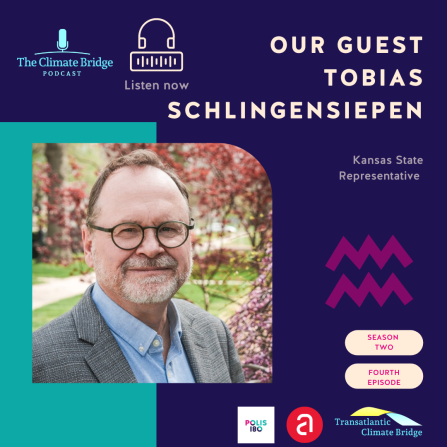
Welcome to the second season of “The Climate Bridge Podcast”, adelphi’s and Polis180’s podcast series. This podcast, like the Transatlantic Climate Bridge initiative behind it, focuses on climate change and climate policy in Germany, the United States and Canada. A key goal of both the initiative and this podcast is to improve climate cooperation between the three countries. In pursuit of this goal, Season 2 welcomes great guests and insightful topics on, among others, the upcoming COP28 or the transatlantic implications of US Inflation Reduction Act.
About this episode
The final episode of season 2 of the Climate Bridge Podcast dives into to the TCBs bread and butter – Transatlantic subnational climate policy. Our hosts Toby Bernstein – adelphi – and Lena Krois – Polis180 – sit down with State Representative Tobias Schlingensiepen (D), of Kansas’ 55th District. Toby, Lena, and Tobias chat about Tobias’ participation in a recent study tour to Germany, state-level climate and environmental policy in Kansas, and post-apocalyptic movies. To learn more about the study tour click here. Tobias and Toby also discussed the United States’ Hydrogen Hubs – more information here. The movie Tobias references is the 1983 film ‘The Day After’.
Guest: Tobias Schlingensiepen
Hosts: Toby Bernstein and Lena Krois
Producers: Toby Bernstein, Lena Krois, Melisa Özcelik
Mixing and post-production: Franz Classe
Music: Maximilian Below
Episode 8
Sara Schurmann & Sven Egenter – Climate Journalism from a German and Transatlantic Perspective
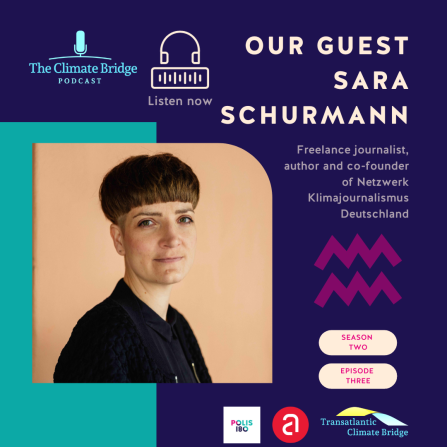
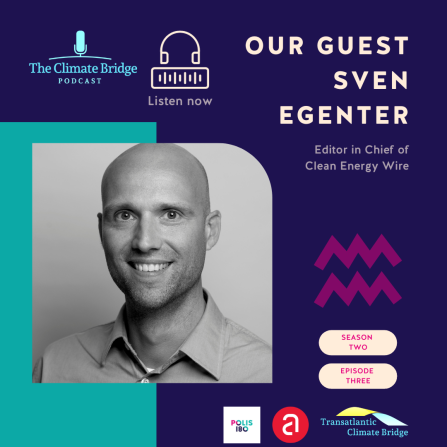
Welcome to the second season of “The Climate Bridge Podcast”, adelphi’s and Polis180’s podcast series. This podcast, like the Transatlantic Climate Bridge initiative behind it, focuses on climate policy and cooperation in and between Germany, the United States and Canada. A key goal of both the initiative and this podcast is to improve climate cooperation between the three countries. In pursuit of this goal, Season 2 welcomes great guests and insightful topics on, among others, the transatlantic implications of the US Inflation Reduction Act and transatlantic knowledge-sharing on climate journalism.
About this Episode:
This episode looks into the role climate journalism plays in fighting climate change, and climate inaction, both in Germany and across the Atlantic. To be an effective tool in achieving this goal, climate journalism depends on greater awareness on climate change as a cross-cutting theme, more factual knowledge and stronger international collaboration in the media.
While our past episodes mostly featured policy experts, we now had the chance to get insights from journalists on climate and energy-related issues. With the support of Toby Bernstein – adelphi –, Cornelius Haritz – Polis180 – spoke with Sara Schurmann (freelance journalist, author, and co-founder of Netzwerk Klimajournalismus Deutschland) and Sven Egenter (Editor in Chief of Clean Energy Wire).
Key points which were discussed include:
- Climate journalism plays an important role in fighting climate change and sharing urgency, action-based information, and best-practices with the public. Journalists should moderate public debates and approach people - also across the Atlantic.
- Knowledge about climate change as a cross-cutting theme and planetary crisis should be integrated into basic university education, beyond specific climate journalism programs.
- Journalists should consider practices and learnings from other international newspapers (integrating climate change as a cross-cutting issue), to create knowledge-sharing with other journalism networks.
Guests: Sara Schurmann & Sven Egenter
Host: Cornelius Haritz
Producers: Cornelius Haritz, Toby Bernstein, Melisa Özcelik
Mixing and post-production: Franz Classe
Music: Maximilian Below
Episode 7
Jesse Scott & Mike Williams – the United States’ Inflation Reduction Act and its transatlantic implications
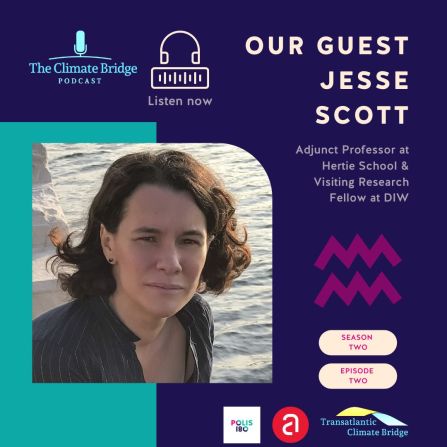
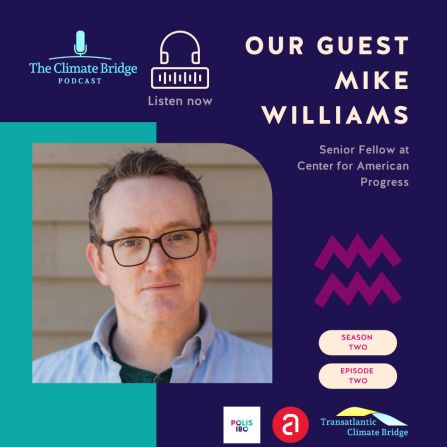
Welcome to the second season of “The Climate Bridge Podcast”, adelphi’s and Polis180’s podcast series. This podcast, like the Transatlantic Climate Bridge initiative behind it, focuses on climate change and climate policy in Germany, the United States and Canada. A key goal of both the initiative and this podcast is to improve climate cooperation between the three countries. In pursuit of this goal, Season 2 welcomes great guests and insightful topics on, among others, the upcoming COP28 or the transatlantic implications of US Inflation Reduction Act.
About this episode
While the last episode dealt with Germany’s road to COP28, this episode sheds a light on the US climate policy perspective and its impacts on the transatlantic sphere. Specifically, it covers the Inflation Reduction Act (IRA) which was signed into law in 2022 and is the most significant piece of climate legislation in US history. This episode dives into the IRA and untangles the intersection between climate, international trade, industrial policy and geopolitics.
With the support of Ole Adolphsen – Polis180 –, Mary Hellmich – adelphi – spoke with Jesse Scott (Adjunct Professor at Hertie School & Visiting Research Fellow at DIW) and Mike Williams (Senior Fellow at Center for American Progress).
Key points which were discussed include:
- The IRA’s main objective and its underlying politics. The legislation is primarily a climate investment policy that centers working people, and the politics present at the time of its passage are crucial to understanding elements of the bill that have caused the most tension with the EU.
- The EU supports the IRA as global signal but remains concerned about trade and investment competition. Remaining tensions in this area include the EU Carbon Border Adjustment Mechanism (CBAM) and differences due to specific European policy toolkits (e.g., taxation and investment policies).
- Transatlantic partnerships are still needed. The IRA is an opportunity for transatlantic discussions through a possible linkage between two strong climate laws whilst building good allies, e.g. to BRICS countries.
- More potential for a circular economy agenda between G7 and the “global south”.
During the episode’s final section, Ole and Mary share their impressions and main take-aways of the interview, while Ole also reveals his German climate-related word.
Side note: If you’re also interested in understanding the environmental and climate justice measures in the IRA, listen to episode 4 that welcomed Dr. Robert Bullard and Nora Löhle interviewed by Mary Hellmich (adelphi) and Kira Schrödel (Polis180).
Guests: Jesse Scott & Mike Williams
Hosts: Mary Hellmich
Producers: Mary Hellmich, Ole Adolphsen, Melisa Özcelik, Mona Hilliges, Hannah Dieterle, Kira Schrödel, Tina Bayer
Mixing and post-production: Franz Classe
Music: Maximilian Below
Episode 6
Jennifer Morgan – Germany’s climate diplomacy & feminist foreign policy
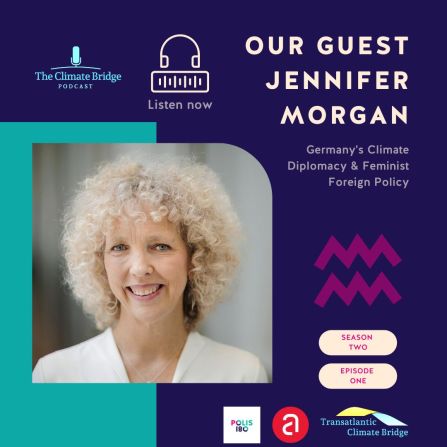
Welcome to the second season of “The Climate Bridge Podcast”, adelphi’s and Polis180’s podcast series. This podcast, like the Transatlantic Climate Bridge initiative behind it, focuses on climate change and climate policy in Germany, the United States and Canada. A key goal of both the initiative and this podcast is to improve climate cooperation between the three countries. In pursuit of this goal, Season 2 welcomes great guests and insightful topics on, among others, the upcoming COP28 or the transatlantic implications of US Inflation Reduction Act.
After finishing up the last season with an episode on climate youth activists and their impressions from COP27 in Sharm el-Sheik, the new season starts off with Germany’s priorities on its road to COP28 in Dubai .
For this episode, our hosts Mary Hellmich – adelphi – and Kathrin Liebhäuser – Polis180 – speak with Germany’s State Secretary and Special Envoy for International Climate Action, Jennifer Morgan. In addition to diving into Germany’s activities for COP28 and discussing the conference’s host, Jennifer Morgan gives insights into her transition from past roles in NGOs to her current position as climate ambassador at the German Federal Foreign Office, as well as into the country’s new feminist foreign policy guidelines. The three women cover key points on:
- Germany’s activities on the road to COP28: Putting forward a transformational road map to close the 1.5 degree Celsius gap and a global renewable energy target
- Direct engagements and science-based conversations with countries with less ambitious climate policies
- Germany’s feminist foreign policy guidelines intersecting with climate policy: Involving marginalized groups in decision-making processes of climate and environmental projects
Guest: Jennifer Morgan
Hosts: Mary Hellmich and Kathrin Liebhäuser,
Producers: Mary Hellmich, Kathrin Liebhäuser, Trisha Kershaw and Melisa Özcelik
Mixing and post-production: Franz Classe
Music: Maximilian Below
Episode 5
Youth Activists – The battle to be heard at COP27

After taking an in–depth look at climate and environmental justice in the last episode, this episode of the Climate Bridge Podcast reflects on the successes and disappointments of COP27 in Sharm el–Sheikh.
Our hosts Tobias Bernstein – adelphi – and Ole Adolphsen – Polis180 – had the chance to interview three climate activists on their impressions from COP27: Molly Rahal, a policy analyst and the youth delegation co–lead of the British Columbia Council for International Cooperation (BICCC) Climate Branch, Cassidy Childs, a research associate at the Center for American Progress focussing on international climate policy, and Linus Steinmetz, a climate activist with Fridays for Future Germany.
Key topics they discussed were the loss and damage funding facility agreement as the first step towards more just climate finance as well as failed attempts to raise ambition on mitigation. All three activists shared some tips on youth activism:
- Recognizing that the barriers youth activists from the global north experienced are still much smaller than those for activists from the global south and indigenous communities, one should use one’s privileges to protest.
- Working closely with a team, whether sticking closely with the delegation or a constituency (e.g. YOUNGO), to get strength and mutual support.
- Have your embassy’s phone number memorized and assess the risks you are taking when you are demonstrating.
Molly recommended her organization’s podcast, Y Talk Climate. The conversation ended with an outlook to COP28.
Guest: Cassidy Childs, Molly Rahal and Linus Steinmetz
Hosts: Tobias Bernstein and Ole Adolphsen
Producers: Kira Schrödel, Tina Bayer, Tobias Bernstein, Mary Hellmich, Trisha Kershaw and Anile Tmava
Mixing and post-production: Franz Classe
Music: Maximilian Below
Episode 4
Dr. Robert Bullard and Nora Löhle – The Transatlantic Fight for Environmental and Climate Justice
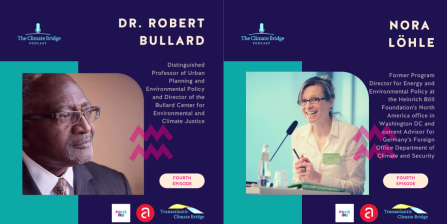
The fourth episode of the Climate Bridge Podcast addresses environmental and climate justice. Hosts Mary Hellmich from adelphi and Kira Schrödel from Polis180 speak with Dr. Robert Bullard, Distinguished Professor of Urban Planning and Environmental Policy and Director of the Bullard Center for Environmental and Climate Justice, nicknamed the “father of environmental justice”, as well as Nora Löhle, former Program Director for Energy and Environmental Policy at the Heinrich Böll Foundation's North America office in Washington DC and current Advisor for Germany's Foreign Office Department of Climate and Security. Mary and Kira discuss with their guests the importance of equal protection and equal enforcement of environmental laws and regulations for all as well as analyze key environmental and climate justice measures in the Inflation Reduction Act. Nora and Robert share their experiences working in the field in the US and Germany as well as address efforts to create environmental and climate justice at the international level.
Guests: Dr. Robert Bullard and Nora Löhle
Hosts: Mary Hellmich and Kira Schrödel
Producers: Kira Schrödel, Tina Bayer, Mary Hellmich, Katharina Lange, and Trisha Kershaw
Mixing and post-production: Franz Classe
Music: Maximilian Below
Episode 3:
Catherine Stewart – Canada’s inclusive approach to Climate Diplomacy
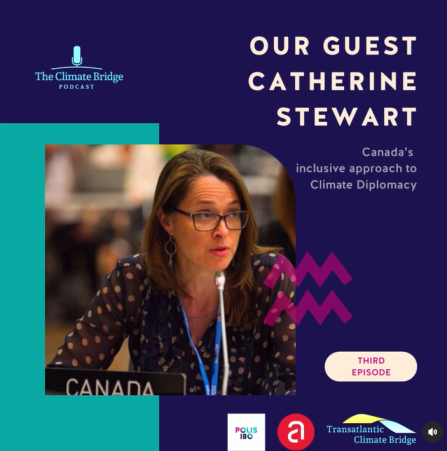
Recorded during the Transatlantic Climate Bridge’s conference in July 2022, the third episode of the Climate Bridge Podcast discusses Canada’s climate diplomacy and the climate and energy outcomes of the G7 meetings. In conversation with Assistant Deputy Minister Catherine Stewart of Environment and Climate Change Canada, our hosts Tobias Bernstein (adelphi) and Luisa Kern (Polis180) took an in-depth look at the interlinkage of climate change and foreign policy, but also at the role of women and indigenous people in climate diplomacy. Focusing on how the green transformation towards carbon-neutrality can also be a just transition that leaves no one behind, the trio took a closer look at multilateralism, Canada’s federal structure, and how to navigate environmental policies in today’s geopolitical landscape.
Guest: Catherine Stewart
Hosts: Tobias Bernstein and Luisa Kern
Producers: Kira Schrödel, Tina Bayer, Tobias Bernstein, Anna-Loreen Mondorf, and Trisha Kershaw
Mixing and post-production: Lars Feyen and Kira Schrödel
Music: Maximilian Below
Episode 2:
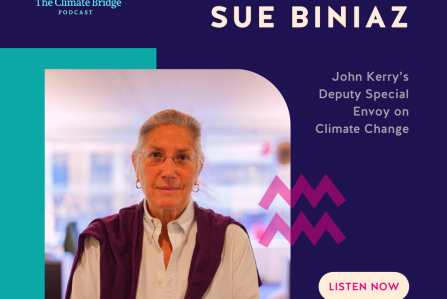
After talking to Lisa Badum about German Climate Foreign Policy in our debut episode, the second episode of the Climate Bridge Podcast turns to the U.S. perspective on international climate policy. Hosts Mary Hellmich – adelphi - and Lars Feyen - Polis180 - speak with Sue Biniaz, John Kerry’s Deputy Special Envoy on Climate Change, about all things U.S. climate policy. The three discuss everything from how Biniaz’s team works both domestically and with international partners to implement initiatives such as the Global Methane Pledge (established at COP26 in Glasgow, the Pledge aims to reduce emissions of methane – a short-lived but immensely potent greenhouse gas – by 30% from 2020 levels by 2030), to the evolving nature of international climate policy in the face of the Russian invasion of Ukraine. Mary, Lars, and Sue share their “climate policy crushes,” and Lars teaches the English-speaking audience a German climate-related legal term.
Hosts: Mary Hellmich and Lars Feyen
Producers: Kira Schrödel, Tina Bayer, Tobias Bernstein and Lukas Seelig
Mixing and post-production: Franz Classe
Music: Maximilian Below
Episode 1:
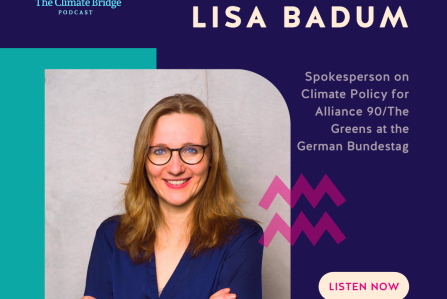
This first episode features an interview with Lisa Badum, a member of parliament for Germany’s Green party. Lisa speaks with hosts Noah Gordon, advisor at adelphi, and Sarah Zitterbarth, climate program leader at Polis180 on topics ranging from Germany’s G7 presidency, to windmill regulations in Bavaria and Texas, to the possibility of a climate club including Germany and North America. Sarah and Noah also discussed their “climate policy crushes”—their favorite policies from across the Atlantic—and explained what long German compound words have to do with climate litigation.
Hosts: Noah Gordon, Sarah Zitterbarth
Producers: Mary Hellmich, Kira Schrödel, Tina Bayer, and Henrik Hansen
Mixing and post-production: Lukas Hochscheidt
Music: Maximilian Below
